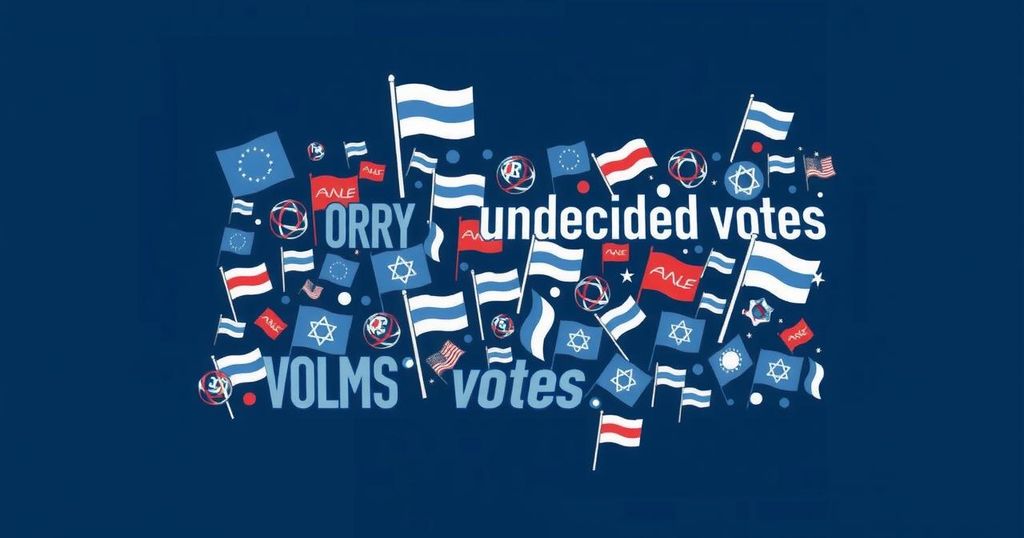Undecided Jewish voters in Pennsylvania face a critical election influenced by Israel-related tensions and rising antisemitism, prompting some to reconsider their alignment with the Democratic Party. Republican outreach efforts seek to sway these voters, while Democrats strive to reassure them of their commitment to Jewish issues. The outcome of this election may hinge on the choices of these pivotal voters.
In battleground Pennsylvania, Jewish voters are facing unprecedented challenges and dilemmas as the election approaches. Stephanie Spielman, a lifelong Democrat from Pennsylvania, has expressed feelings of emptiness and has decided to leave the Democratic Party, citing a lack of genuine engagement with the Jewish community. “I do not believe they are seriously supporting the Jewish community. They are not seriously engaging with us,” she stated while reflecting on her decision. Historically, Jewish Americans have formed a substantial part of the Democratic coalition, yet recent events—including the ongoing humanitarian crisis in Gaza and a surge in antisemitic incidents—have led some to reconsider their allegiances. The Republican Party sees an opportunity to sway Jewish voters, particularly in key states like Pennsylvania, where approximately 300,000 Jewish voters could influence the outcome of the election. The Republican Jewish Coalition has intensified its outreach efforts, utilizing comprehensive voter data to craft targeted messages. Its members highlight concerns that resonate with Jewish voters, including issues pertaining to Israel and rising antisemitism, alongside domestic economic issues such as inflation. Matt Brooks, the coalition’s CEO, emphasized, “We know, almost to a voter, what the issues are that motivate them, and we can deliver a message.” Amidst this political landscape, some Jewish voters remain undecided. Democrats, aware of the potential impact of these voters, are actively campaigning to reassure them of their commitment to the Jewish community. Organizations like the Zioness Action Fund strive to communicate the Biden administration’s historic support for Israel, emphasizing significant military aid provided to bolster Israel’s defenses against threats. Simultaneously, Democrats are countering disinformation about their candidates, particularly Vice President Kamala Harris, who has faced scrutiny regarding her stance on Israel. Halie Soifer, the executive director of the Jewish Democratic Council of America, remarked on the need for clarity and demonstrated commitment from Harris towards the Jewish community. The Republican Jewish Coalition is also spending considerable resources on campaign ads that aim to portray Harris unfavorably while presenting Trump as a protector of Jewish interests. These efforts include highlighting Harris’s alleged associations with progressive lawmakers labeled as hostile to Israel. In this contentious environment, Jewish voters, encapsulated by individuals such as Danny Weiss and Harry Willner, express their ambivalence and uncertainty about both candidates. Their perspectives underscore the complex realities facing Jewish voters as they navigate their political choices in an increasingly divided context. As election day approaches, the decisions of these undecided Jewish voters in Pennsylvania could prove pivotal in determining the outcome of the presidential race, emphasizing the critical nature of their electoral influence.
The article discusses the significant role of undecided Jewish voters in Pennsylvania as they contemplate their electoral choices amidst heightened tensions related to Israel and rising antisemitism. Historically, Jewish Americans have aligned with the Democratic Party; however, current geopolitical dynamics and party responses have led to a reevaluation of allegiance among some voters. The ongoing conflict in Gaza and domestic issues have served as a catalyst for intensified outreach by the Republican Party, aiming to bridge connections with this demographic. This context is essential to understanding the motivations and feelings of Jewish voters in the current electoral climate.
The dynamics of the upcoming election in Pennsylvania hinge on the opinions and decisions of Jewish voters, many of whom are exercising newfound caution in their political affiliations. With the rise of antisemitism and the Israeli-Palestinian conflict shaping their perceptions, these voters stand as crucial swing participants. The competing narratives from both Democrats and Republicans provide a landscape rife with both opportunity and uncertainty as these individuals navigate their political destinies.
Original Source: www.cnn.com






